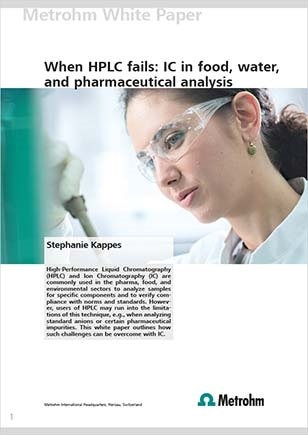What’s the difference between High Performance Liquid Chromatography (HPLC) and Ion Chromatography (IC)? What are the capabilities and limitations of each technique? Knowing these differences can actually make a huge difference. As a proven, robust and highly versatile technique, IC can help HPLC users extend their analytical capabilities tremendously. Our free white paper compares the two methods systematically focusing on the strengths of ion chromatography.

HPLC is one of the most powerful analytical techniques in the modern laboratory. From research to manufacturing to legal, it is widely used in many sectors. However, there are some inherent limitations. Ionic and polar compounds pose a challenge. So do organic acids. Moreover, some analytes such as, e.g., fluoride and chloride are not active in the UV range, making it impossible to determine them with a UV detector, the detection technique most commonly used with HPLC. Ion chromatography (IC), on the other hand, is ideal for the separation and detection of ions and polar molecules, both organic and inorganic. This makes IC the ideal extension of HPLC increasing the analytical capabilities of the modern laboratory tremendously.
Over the last 30+ years, Metrohm has made Ion Chromatography a powerful tool for both research and routine analysis. Laboratories in the pharma, food, and water sectors in particular benefit not only from the method itself but from many automated inline sample preparation and injection techniques. Samples with a high load of particles (e.g., waste water), solid and even gaseous samples can be analyzed fully automatically down to the µg/L range with superior reproducibility. Hundreds of IC applications are available free of charge from the Metrohm Application Finder and users are supported in more than 120 countries by application specialists from the local Metrohm sales organizations.